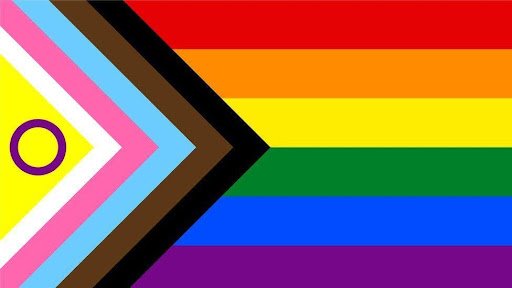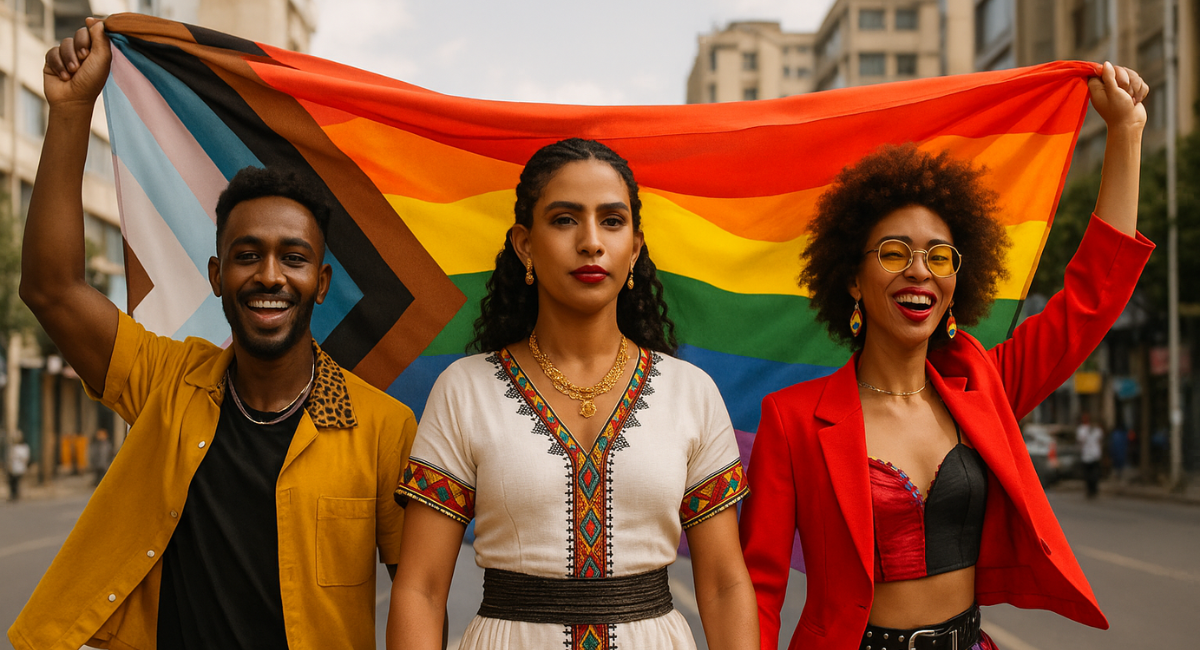Some use ‘queer’ as an umbrella term for people who are not heterosexual or cisgender, but others reject it. Fatteh tends to use ‘LGBTQ+’.
As LGBTQ+ Ethiopians fight on the frontlines for their survival and fundamental human rights, the community’s advocates, activists and allies must join forces, coordinating strategic campaigns to win hearts, minds and legislative victories.
by Beza Lealem
The rainbow flag is a universal symbol of pride and support for LGBTQ+ people, brandished by community members and allies as they stage celebrations and stand up for their rights. The spectrum of colours on the flag represents the diversity of identities within the community, across a range of sexual orientations, gender identities, expressions and sex characteristics (SOGIESC). Behind this vibrant emblem are the people we call the ‘Rainbow Army’.
Some members of this global army are on the frontline while others battle from the trenches. Nowhere is this more the case than in countries like Ethiopia. The term ‘Rainbow Army’ aptly captures the resilience and courage of Ethiopian and Ethiopian-descent LGBTQ+ (Lesbians, Gays, Bisexuals, Transgender and Queer*) people as they fight for their survival and fundamental human rights amid widespread hatred and targeted attacks. Their struggle may be unique, but it resonates across the continent.
Throughout most of Africa, anti-LGBTQ+ rhetoric is on the rise, with tightening laws and harsher punishments introduced in countries like Uganda and Ghana. Even in places where there have been gains, like Botswana and Angola, the community remains vulnerable to public opposition and the potential rollback of hard-won victories.
In some places, the situation has become so dire that, when Amnesty International published its report on the topic, the NGO called it ‘We Are Facing Extinction: Escalating Anti-LGBTI Sentiment, the Weaponization of Law and their Human Rights Implications in Select African Countries.’
Describing it in this way is not hyperbole, stresses Tigere Chagutah, Amnesty International’s regional director for East and Southern Africa. “Across Africa, LGBTI persons find themselves contending with a disturbing regression of progress, facing relentless protests against their identities, and confronting formidable obstacles to their legal and social rights,” said the Johannesburg-based expert last year.
“Arbitrary arrests and detentions have become all too common, treating the mere act of being oneself as a criminal offense. In some places, the death penalty looms as a terrifying spectre, a brutally unjust punishment for simply being who they are. We face what can only be described as a deepening crisis of homophobic lawfare.”
In Ethiopia, the LGBTQ+ community continues to quietly advocate for respect, acceptance and equality amid a hostile political and social environment characterised by the criminalisation of same-sex sexual acts and persecution through violent physical assaults, discrimination and harassment.

The added features on the ‘progress pride flag’ symbolise marginalised sub-groups of the community including LGBTQ+ people of colour, transgender people, intersex people and others.
Across the country, influential religious leaders and state actors incite violence against gay individuals, promoting extreme measures that foster a climate of fear and hostility. Prevailing societal attitudes and cultural norms make it extremely dangerous for LGBTQ+ people to exist in the places they once called home. Once invisible, the community now confronts slogans like “I stand against sodomy!” with demonstrators openly rallying in the streets of Addis Ababa.
The challenges facing Ethiopia’s LGBTQ+ community extend far beyond criminalisation. Individuals are targeted not only by the law but also by rampant mob violence. Two religious groups were heard fighting for ‘bragging rights’ over this disturbing trend, which both claim to have started three years ago. Since then, the mobilisation of vigilantes to kill people based on their perceived homosexuality has become a phenomenon on TikTok, with livestream content creators motivating others to incite violence and fuel a cycle of brutality.
These persistent threats create an atmosphere where harassment and assault are daily realities, compelling many to conceal their identities to survive. In light of the worsening picture, it’s no surprise that 94% of LGBTQI+ Ethiopians and Ethiopian-descent people believe the country is unsafe for them, according to a survey by human rights organisation ReportOut, in partnership with Ethiopian LGBTQ+ advocacy group House of Guramayle (HoG), in their recent report ‘Out in Ethiopia’.
Another growing trend, the forced outing of LGBTQ+ individuals and their allies, underscores these dangers, amplifying fears of violence and social ostracism. As both state and non-state actors embolden perpetrators, the resilience of the community is crucial.
This is the time to be vigilant. We must remind ourselves that we are all fugitives in this struggle until LGBTQ+ people cease to be seen as adversaries, aberrations or deviants. Against this backdrop, some members of our community have appropriated ‘zega’, an Amharic term for ‘citizen’ used to denote same-sex-attraction in a discreet but poignant way. As LGBTQ+ Ethiopians who rightfully belong in our country, we are not seeking special permission or privilege. We seek justice by demanding that our fundamental human rights be respected and upheld.
“We must remind ourselves that we are all fugitives in this struggle.”
Allies who wish to join the Rainbow Army can help by actively opposing homophobia and transphobia and advocating for equality. Acknowledging the scale of opposition we face, we remain hopeful that together we can raise awareness, increase visibility, and foster greater acceptance of LGBTQ+ people at the grassroots level. We must also use soft power to encourage cultural leaders to join us in challenging the status quo across key sectors like the media and entertainment.
Shifting public opinion and making other positive changes in society will require clever, creative and well-organised campaigns, but political reform is also urgently needed. We must gather our strength for what will be a long and arduous battle ahead, from routine skirmishes with the local Woreda council to engagements with Parliament and the Prime Minister’s Office. To persuade government officials to protect and empower LGBTQ+ people, our advocates and activists should adopt a more strategic, deliberate and focused approach. Lobbying policymakers to legislate change will require an action plan with clear objectives. Only then can we inspire, influence and cajole the political class into supporting our cause.
Fortunately, a report submitted to the United Nations Human Rights Council aims to do exactly that. Authored by HoG and The Advocates for Human Rights, the ‘Ethiopia Stakeholder Report for the United Nations Universal Periodic Review’ made eight recommendations to the Ethiopian government last year.
The report urges Ethiopia to decriminalise same-sex relations and protect LGBTQ+ individuals from discrimination, arbitrary arrest, and abuse by law enforcement, religious leaders and vigilante groups. It calls for accountability for human rights violations, public education to reduce stigma and violence, and specialised training for service providers on LGBTQ+ issues. It also recommends formally recognising LGBTQ+ people as a key population in national health strategies and revising hate speech laws to protect against harassment online and offline.
How did the Ethiopian government respond to these calls for action? It’s not yet clear whether any political or diplomatic officials have seen or commented on the recommendations. However, Fatteh will continue to probe the matter to uncover any outcome and hold the government to account. After all, it’s the future of every single one of us that hangs in the balance.
The fight for LGBTQ+ rights in Ethiopia is a serious human rights issue — not a tool for performative activism or a means to collect likes and followers through empty virtue signalling. It demands collective action and solidarity from everyone. Now is the time to stand alongside the Rainbow Army, ensuring that love triumphs over hate and that every individual can lead an authentic life without compromising their security, dignity or freedom. Never have the stakes been higher.
If you would like to join the Rainbow Army by collaborating with or supporting Fatteh, or if you would like signposting to any of the groups associated with the Ethiopian LGBTQ+ movement, email us at info@fattehmagazine.com.

